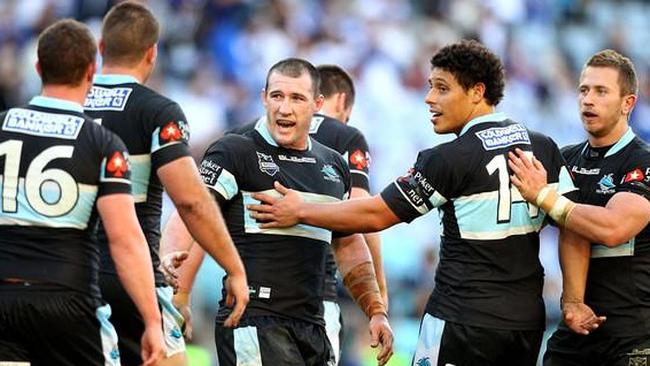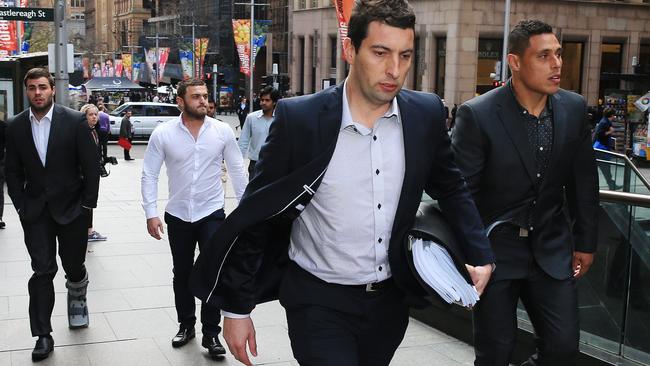How Cronulla avoided an Essendon -style ASADA disaster
IF they hadn’t confessed to ASADA, the Cronulla Sharks could have easily shared the long term bans that have crippled Essendon writes REBECCA WILSON.

Sharks
Don't miss out on the headlines from Sharks. Followed categories will be added to My News.
Rugby League bosses, and more particularly Cronulla players, would have grins like Cheshire cats on Tuesday.
They would be sitting back and looking at the meagre penalties handed out to Cronulla players, all done and dusted now, and laugh at the arrogance of the AFL and Essendon.
Seventeen Sharks players faced the music in 2014 after receiving show cause notices from ASADA. Their doping was alleged to have occurred in 2011, was overseen by Stephen Dank using illicit peptides that were different from the ones administered to Essendon, and was also the subject of an ASADA investigation.
The players were outraged at the time. They had been given 36 hours to accept a guilty plea or face a protracted hearings process and much stiffer penalties. They felt they were being denied natural justice and that they would be forever labelled drug cheats.
But their managers and their club told them they faced a two year legal battle, up to a million dollars in legal fees and then up to two year bans. The penny dropped and they copped their punishment.
They reluctantly signed the forms, served backdated suspensions and the world barely noticed they had gone before they were back on the field. In most cases, backdating meant the real penalty was three weeks.
Among them was NSW captain, Paul Gallen, who might have that drug cheat asterisk next to his name but it hasn’t stopped him from forging a media career and remaining at the helm of the Origin campaign for the Blues.
In Cronulla’s favour was that although there was a six week period when the entire team was using injections, the NRL and ASADA could not prove the doping was any more extensive than that.
By the time Dank reached Melbourne, he had a formal supply chain and the CAS findings outlined the extent and sophistication of the peptide program at Essendon.
The AFL and Essendon have found out the hard way that trying to sweep all of this under the carpet, without genuine transparency from anyone, can lead to a disastrous result for the sport. There has been no inclination to solve matters in a cooperative process with ASADA like there was in rugby league.
FURY: AFLPA call for league to dump WADA code
CASH: Banned Bombers could sue for millions
LAUGHABLE: Dank slams ban
EVIDENCE: How the players were condemned

The disparity between the Cronulla and Essendon cases underlines why football codes should not be permitted to administer their own justice to players on drug matters.
The complete spurning of ASADA by the AFL and the way in which Essendon bosses treated ASADA investigators has been a disgrace. It came back and bit the 34 players.
All of this could be solved with the formation of an independent drugs tribunal covering all sport in Australia which would perform the role of a permanent CAS — free of partiality, favour and backroom deals.
ASADA does not want to catch fair athletes. It does not want to victimise anyone who does the right thing. It wants a level playing field for all, and no cheating, something the Essendon football club may now realise are the only things that really matter in sport.




